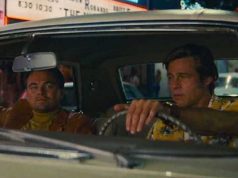Movies that make fun of the movie-making process are not particularly rare, but ones that are funny without being farcical are as precious as diamonds. David Mamet’s “State & Main” is exactly that, hitting the Hollywood mentality with deadly accuracy, without resorting to aiming at the broad side of the barn.
In the film, Hollywood director Walt Price (William H. Macy) and company descend on quintessential American small town Waterford, Vt. to film a movie. Their budget having already been wasted in New Hampshire (from which they were run out of town on a rail), they are delighted to find that Waterford has a fire station and an old mill, thus saving them the expense of building sets.
Alas, the historic old mill burned down in 1960, so Walt tells screenwriter Joseph Turner White (Philip Seymour Hoffman) to write the old mill out of the script. And this is where “State & Main’s” first great joke comes in, when we find out the name of the film they’re working on: “The Old Mill.”
To any sane person, not having an old mill for a film centering around an old mill would be an insurmountable problem. For Hollywood folks, though, it’s a minor setback. A few quick rewrites, and we’re back on track.
Joseph starts to become disillusioned over this; he alone realizes the futility in hoping to fix such a serious problem with a few script changes. Supporting and inspiring him is local bookstore-owner and amateur theater-director Ann (Rebecca Pidgeon), who is engaged to local politico Doug (Clark Gregg), who is jealous of her friendship with Joseph and seeks to thwart the film somehow.
Also in this ensemble comedy, in which the several plot lines get almost equal weight, is Walt and producer Marty Rossen’s (David Paymer) attempt to keep cocky leading man Bob Barrenger (Alec Baldwin) from hitting on the local under-age girls, especially Carla (Julia Stiles), who knows of Bob’s penchant for youthful lovers and goes after him full-speed. Walt and Marty also have woes with Bob’s co-star, Claire Wellesley (Sarah Jessica Parker), who signed a contract agreeing to appear nude in the film but has since found religion and refuses to exploit herself.
There’s also a windbag mayor (Charles Durning) and his socialite wife (Patti LuPone), a dangerous pothole on Main Street, and a local obsession for the town’s football team, the Huskies.
Full of crackling, vibrant dialogue, the film skewers Hollywood without becoming a pie-in-the-face exercise in absurdity. We learn that an “associate producer” credit in a film is “what you give your secretary instead of a raise.” We hear Walt insist he will not allow product placement in “The Old Mill” and then, a few scenes later, characters walk past a soda machine on which the Pepsi logo has been greeked out, thus preventing product placement in “State & Main,” too.
More darkly, it dawns on the viewer as the film progresses that integrity — both moral and artistic — is almost unheard of in this environment, as nearly everyone sells out or settles. It’s a dim (though probably fairly accurate) view of Hollywood, but so what? It’s only Hollywood. It’s not like we’re saying the government or our religious leaders are corrupt; we’re just saying movie people can be bought and sold. That’s more funny than disheartening.
This is a dream cast, with Macy, Hoffman, Paymer, Parker and Baldwin all playing their roles with zeal and intelligence. It takes a certain kind of actor to pull off Mamet’s stammering, realistic dialogue; ironically, his wife, Rebecca Pidgeon, is one of the worst at this (yet she continues to appear in all his movies). Macy, who has known Mamet since their college days together, is an old pro at it, making it sound exactly as natural as it’s supposed to.
It’s full of great one-liners, amusing plot twists and whimsical performances. And by the end, you’ll wish they’d actually made a movie called “The Old Mill,” because seeing what went behind the scenes will have completely intrigued you.
A- (; )





